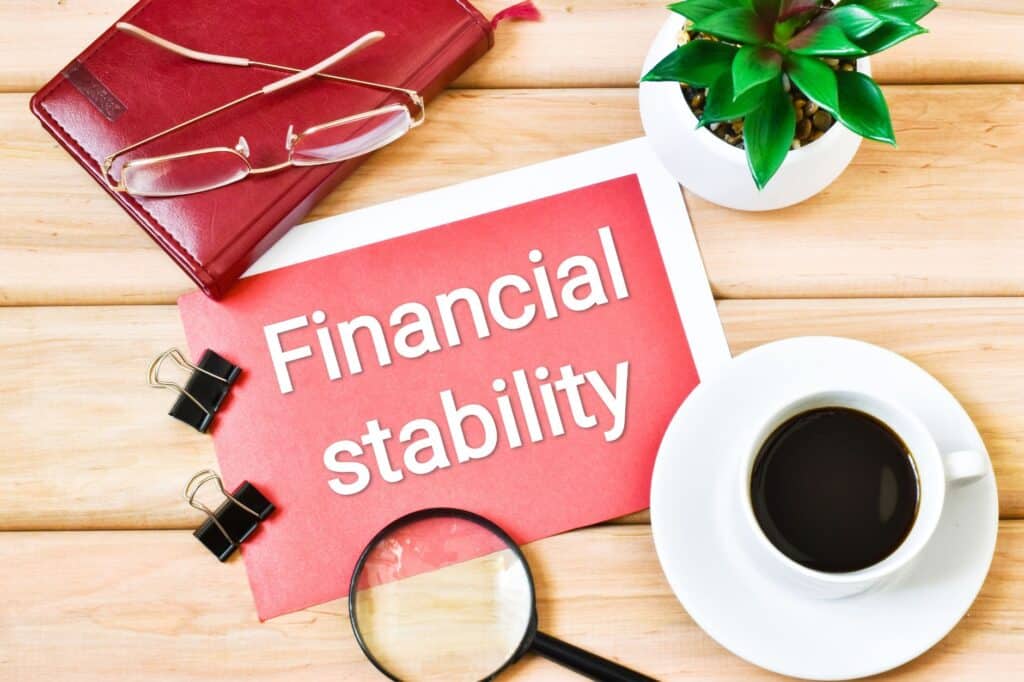Last updated on August 25th, 2025
Confidence often feels like an unreachable goal when your finances are in chaos.
The truth is that gaining control of your money is not just about numbers, it’s about peace of mind.
Managing your budget helps reduce stress, frees up energy for self-care, and builds emotional security.
Just think about it: wouldn’t life feel lighter if you weren’t worried about the next bill?
The relationship between financial stability and confidence is simple yet powerful. When you start taking small, consistent steps with your money, you’re also taking care of your future self.
It might mean setting a budget, learning to save, or even focusing on purposeful spending.
Each step builds trust in yourself and makes it easier to prioritize your well-being.
If you are you ready to bring some calm into your life, let’s learn how to balance self-care and financial growth to create a confident, less-stressed version of you.
Understanding Financial Stability
When it comes to confidence, financial stability plays a significant role.
It’s the foundation that helps you feel secure, capable, and ready to face life’s challenges. Just like having a safety net for whatever life throws your way.
What is Financial Stability?
Picture this: a sturdy table with four strong legs. Financial stability works the same way, supported by some key factors:
- Emergency Savings: A safety cushion for unexpected expenses, like car repairs or medical bills.
- Steady Income: Knowing money is coming in regularly to handle your needs gives you peace of mind.
- Low-Impact Debt: This doesn’t mean being debt-free but ensuring any loans or credit are within limits you can easily manage.
- Practical Budgeting: Making sure your spending aligns with your priorities (remember, budgets aren’t chains, they’re simply roadmaps!).
Financial stability isn’t about being rich. It’s about balance and having systems in place to cushion the financial bumps you might hit.
It’s empowering to know that when trouble comes knocking, you can handle it without throwing everything into chaos.
Why Financial Stability Matters for Confidence
Ever noticed how good it feels to know you’ve got everything under control?
That’s the magic of financial stability. It creates a ripple effect, starting with your mental health and radiating into your daily life.
- Reduces Stress: Money stress is a heavy weight. But when you’ve got financial stability, you’re lifting that weight off your shoulders. You sleep better, think clearer, and even breathe easier.
- Encourages Independence: Imagine not needing to ask for help with every unexpected bill. That sense of self-sufficiency makes you more confident in your decisions.
- Boosts Decision-Making: Knowing your finances are stable means you can make choices without fear of the unknown. Want to change jobs or take a break? Stability gives you options.
For example, studies have linked financial stress to higher levels of anxiety, depression, and fatigue.
On the other hand, feeling financially secure can improve mental clarity and bring an easier sense of calm.
It’s not just money, it’s about feeling like you’ve got a handle on life. When your wallet is in order, your world feels a little lighter.
Practical Steps to Build Financial Stability
Financial stability is about gaining control and giving yourself breathing room to focus on what really matters in life.
Achieving this doesn’t happen overnight, but small, intentional changes can create a ripple effect of stability and confidence. Let’s look at a few practical steps you can take.
1. Creating and Sticking to a Budget
Budgeting isn’t just a financial tool—it’s your personal guide to freedom. Think of it like using Google Maps for your money: it keeps you on track, helps you avoid unnecessary detours, and ensures you reach your goals without getting lost.
Here’s a simple framework to start:
- Track Your Income: Write down exactly how much you’re bringing in each month.
- List Essential Expenses: Include rent, utilities, groceries. Anything you can’t do without.
- Identify Non-Essentials: Spot areas that feel nice-to-have but can wait (those daily coffee shop trips might add up).
- Set Saving Goals: Treat your savings like another bill; make it non-negotiable.
- Give Yourself Grace: Don’t aim for perfection. Life happens, learn and adjust.
The trick is consistency. Small adjustments over time make sure you stay in control, rather than letting your money control you.
2. Building an Emergency Fund
Life loves to throw curveballs. Your car might need a sudden repair, or maybe there’s an unexpected medical bill. An emergency fund is like a cushion. It softens the blow when life hits hard.
Here’s how to get started:
- Set Small, Achievable Targets: Aim to save for one month of expenses first, then build from there.
- Create a Separate Account: Keep this fund completely separate from your everyday spending to avoid temptation.
- Automate Savings: Set up automatic transfers to make saving something you don’t even have to think about.
Even $20 a month starts to add up, proving it’s about progress, not perfection. Building an emergency fund is one of the most stress-relieving habits you can adopt.
3. Reducing Debt Strategically
Debt can feel like a ball and chain, holding you back from your dreams. But guess what? You can break free, one step at a time. Start by understanding your debts: credit cards, student loans, medical bills, and tackle them strategically.
- Focus on High-Interest Debt First: These tend to grow faster than you’d think. Paying them off saves you money long-term.
- Consider the Snowball Method: Pay off the smallest debt first to feel the momentum, then tackle the next one.
- Consolidate, If Needed: A lower-interest loan or balance transfer might simplify payments and save interest.
Every payment you make is a step forward, unlocking freedom. If you’re feeling stuck, journaling about your goals can keep you motivated. Something explored beautifully in Journaling for Self-Care: Simple Ways to Feel Better Every Day.
It’s about mental clarity along with financial responsibility.
4. Investing in Financial Literacy
Would you fly a plane without knowing how to use the controls? Of course not. Managing your money is the same: having the right knowledge puts you in the pilot’s seat.
Here are a few things to study up on:
- Understanding Credit Scores: Learn what impacts them and how to improve yours.
- Basics of Investing: Start small, even with simple apps, to grow your money over time.
- Retirement Funds: It’s never too early to think long-term.
5. Automate Your Savings
Automating your savings eliminates the need to rely on willpower or memory to save money. Set up recurring transfers from your checking account to a dedicated savings account each month, aligning with your paydays.
This ensures your savings grow consistently without any extra effort on your part. Start small, and increase the amount as your finances improve.
Over time, you’ll build a financial cushion without even noticing the money leaving your account.
6. Live Within Your Means
Living within your means means spending less than you earn and avoiding unnecessary debt. It requires you to differentiate between needs (like housing, food, and utilities) and wants (like luxury items or frequent dining out).
Avoid lifestyle inflation—when income rises, resist the temptation to spend more just because you can.
Instead, prioritize saving and investing the extra income to secure your financial future. It’s about making mindful choices that align with your long-term goals.
7. Invest in Your Future
Investing early, even with a small amount, is one of the most effective ways to build wealth.
Thanks to compound interest, your money can grow exponentially over time.
Begin with retirement accounts like a 401(k) or IRA, or explore low-risk options like index funds or ETFs if you’re new to investing.
Don’t wait for a large amount of money to start; consistency is more important than the size of your initial investment.
Investing is about planting seeds today to enjoy financial freedom tomorrow.
8. Track Your Progress
Financial goals are easier to achieve when you track your progress regularly.
Set aside time each month to review your budget, assess your spending, and check how much closer you are to your goals.
Tools like budgeting apps or spreadsheets can help you visualize your progress.
Tracking allows you to spot and correct mistakes, celebrate small victories, and stay motivated to keep moving forward.
It’s a reminder that every step, no matter how small, contributes to your success.
9. Educate Yourself
Knowledge is one of the most powerful tools for managing money effectively.
Dive into personal finance books, listen to podcasts, or attend workshops to improve your understanding of saving, investing, and budgeting.
Stay informed about topics like interest rates, credit scores, and retirement planning.
As you become more educated, you’ll feel empowered to make informed financial decisions, avoid common pitfalls, and take control of your money with confidence.
10. Practice Gratitude and Patience
Financial stability is a journey, not a race. It’s easy to get frustrated when progress feels slow, but practicing gratitude can shift your mindset.
Focus on what you’ve achieved and the resources you have, rather than dwelling on what’s missing.
Patience is key. Building wealth takes time and consistent effort.
Celebrate small wins, like paying off a debt or reaching a savings milestone, and remind yourself that every step forward is progress toward a more secure and confident financial future.
Connecting Financial Wellness to Self-Care
Financial wellness isn’t just about numbers on a spreadsheet or having a fat savings account. It’s about aligning your money choices with your personal well-being.
When you connect financial wellness with self-care, the results are transformative. It’s about gaining control over your life while creating more space for joy, confidence, and peace.
Spending Money on Self-Care Wisely
Taking care of yourself doesn’t have to mean breaking the bank.
In fact, some of the best self-care practices are free or budget-friendly! Think about it: self-care is not indulgence, it’s about balance.
Here are some affordable ideas to get started:
- Take a Nature Walk: Fresh air and a quiet moment with nature can recharge your mind without spending a dime.
- DIY Spa Day: Light some candles, soak your feet, or try an at-home facial with ingredients already in your pantry.
- Practice Journaling: Reflecting on your goals and wins is an incredibly grounding self-care practice. Need tips? Check out Journaling for Self-Care: Simple Ways to Feel Better Every Day.
- Virtual Library Trips: Many local libraries now offer free eBooks or classes. Learning something new can be a form of self-care too!
Even setting boundaries, saying no when you need to rest, or simply taking a few minutes to breathe deeply can serve as a connection between self-care and spending wisely.
The Emotional Freedom of Stability
Money worries can feel like carrying a constant weight. We’ve all been there. Sleepless nights, nervous stomachs, or endless “what ifs.” Financial stability, in a way, is like finally exhaling after holding your breath for too long.
When you’ve got your finances in order, it’s more than just numbers. You’re gifting yourself peace of mind:
- You don’t lie awake worrying about emergencies.
- Life feels manageable, not overwhelming.
- You’re able to focus on what matters. Family, health, your passions.
This emotional freedom almost works like magic by giving you space to breathe and process.
Building Confidence Through Achievements
Every financial milestone you hit is a confidence boost that feels better than any quick fix could. There’s something deeply satisfying about looking at what you’ve achieved, no matter how small it might seem.
For instance:
- Saved up for a goal? Celebrate it! Whether it’s a small vacation or a long-awaited purchase, you’re proving to yourself that you can follow through.
- Paid off a debt? That’s worth a fist pump! Take pride in breaking one more shackle holding you down.
- Made a budget and stuck to it? You’re setting foundations that will only grow stronger with time.
These wins don’t just help your bank account. They build your self-confidence and show you what you’re truly capable of.
When financial achievements meet self-care practices, the result is motivation. The kind that propels you forward.
It’s not just about the money in your account; it’s about believing in yourself, one goal at a time.
Balancing Confidence and Financial Goals
Financial wellness doesn’t happen overnight, but with consistent effort, it creates the foundation for a more confident you. The good news? You don’t need to overhaul everything at once.
Through focusing on achievable steps and celebrating your progress, you’ll start to feel not only more financially stable but also emotionally stronger.
Setting Achievable Financial Goals
Setting financial goals can be intimidating if you shoot straight for the stars. Instead, think about a ladder. Eeach rung is a small, manageable step you can climb.
Start with something that feels reachable, and build up your confidence as you achieve each step.
Here’s how you can set realistic and motivating goals:
- Start with Clarity: Write down what you truly want. Is it buying a new laptop? Saving for a down payment? Prioritize what matters to you most.
- Break It Down: Large goals can feel overwhelming. Divide them into smaller, bite-sized steps. Llike saving $20 a week instead of aiming for $1,000 all at once.
- Set a Timeline: Open-ended goals lack focus. Make it measurable by choosing a realistic deadline.
- Track Progress Regularly: Check your progress monthly. Seeing how far you’ve come can keep you motivated.
- Celebrate Milestones: Each milestone towards your big goal is an achievement. Acknowledge it. You deserve the confidence boost!
Remember, achieving financial goals starts small and grows with time.
Celebrating Small Wins
Recognizing progress might sound trivial, but it’s one of the most powerful motivators out there.
Small wins prove to you that your efforts are paying off and remind you to keep going, no matter how modest the achievement.
Why does celebrating matter? Let’s break it down:
- It’s a Mood Booster: Hitting a milestone, big or small, releases feel-good chemicals like dopamine. You not only feel happier, but you also become more confident in your skills. Even adding a few extra dollars to your savings is a win worth celebrating.
- Keeps the Momentum Alive: Each celebration reinforces your commitment. It’s like putting a penny in your “confidence jar” for each positive step forward.
- Creates a Positive Feedback Loop: When you acknowledge small wins, you start associating those moments with joy and progress. This makes it easier to continue challenging yourself.
How can you celebrate without blowing your budget? Easy:
- Treat Yourself with Purpose: Did you save for three months straight? Use a bit to treat yourself to a favorite coffee or snack.
- Say It Loud: Share your progress with a close friend or journal about how you feel, sometimes acknowledging it is celebration enough.
- Plan a Low-Cost Activity: Go for a picnic, explore nature, or catch up on a favorite book as a reward.
Celebrating your wins aligns your money journey with emotional growth, making the experience feel valuable instead of draining.
Even the smallest wins build momentum for bigger achievements. Financial freedom isn’t a leap; it’s one small step at a time.
Final Thoughts
Building confidence through financial stability is about creating a budget, and experiencing a life free from constant money worries.
It’s the small wins, like starting a savings plan or paying off a little debt, that create a powerful ripple effect in your day-to-day life.
Remember, it’s okay to start small. Maybe it’s setting aside $10 this week or finally looking at your expenses without feeling overwhelmed. Every step forward matters.
Think of financial wellness and self-care as a partnership.
Together, they create space for peace, joy, and resilience.
If you’re exploring ways to boost confidence, consider insights from What Represents Confidence: Master Self-Assurance Guide. They pair perfectly with your journey toward financial growth.
For step-by-step budgeting tips, you can explore Budgeting and Goal Setting | Financial Literacy – Yale University. It’s all about making your efforts count!
You’re not just working on your finances, you’re building a future where you feel confident and in control, every step of the way. Take that first step today. You’ve got this!
Love what you see? Share the love with friends and pin it to your Pinterest. Every share and pin means the world to us, helping us inspire more people. Subscribe and share now so we make positive changes together.






